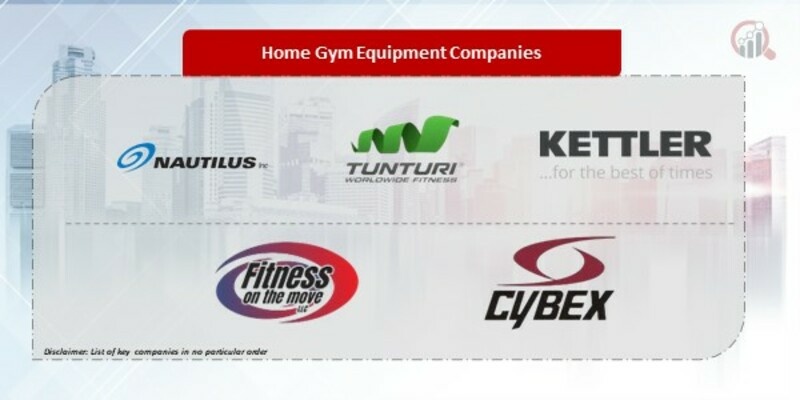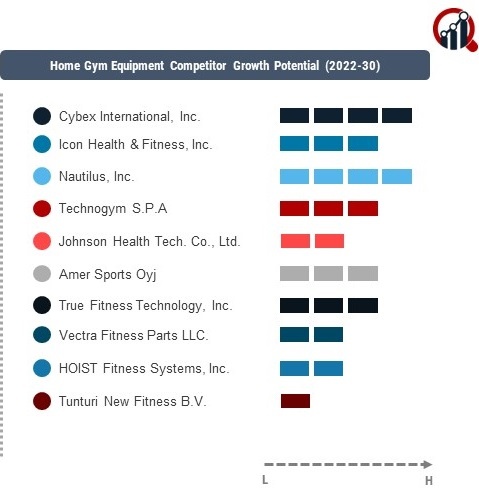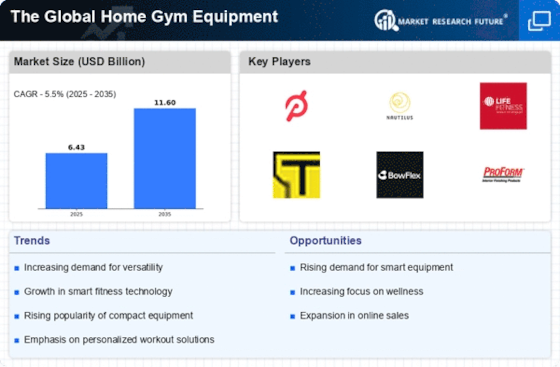Top Industry Leaders in the Home Gym Equipment Market
 The competitive landscape of the home gym equipment market is experiencing robust growth, driven by a global shift towards home-based fitness solutions and a heightened focus on health and wellness. As of 2023, key players dominate this dynamic market, employing a range of strategies to establish market dominance and capture a significant share.
The competitive landscape of the home gym equipment market is experiencing robust growth, driven by a global shift towards home-based fitness solutions and a heightened focus on health and wellness. As of 2023, key players dominate this dynamic market, employing a range of strategies to establish market dominance and capture a significant share.
Key Players:
Cybex International, Inc. (U.S.)
Impulse (Qingdao) Health Tech Co., Ltd (China)
Kettler (GB) Limited (U.K.)
Fitness EM LLC. (the U.S.)
Tunturi New Fitness B.V. (Netherlands)
DHZ Fitness Group GmbH (Germany)
Hammer Sport AG (Germany)
HOIST Fitness Systems, Inc. (U.S.)
Vectra Fitness Parts LLC. (the U.S.)
True Fitness Technology, Inc. (U.S.)
Amer Sports Oyj (Finland)
Johnson Health Tech. Co., Ltd (U.S.)
Technogym SpA (Italy)
Nautilus, Inc. (U.S.)
Icon Health & Fitness, Inc. (NordicTrack) (U.S.)
Strategies Adopted:
Strategies adopted by key players often revolve around innovation, digital integration, and brand loyalty. Peloton's success, for example, is built on its unique business model combining hardware sales with subscription-based content. Nautilus Inc. leverages its legacy brand identity while continuously introducing new products to stay relevant in a competitive market. Technogym invests in smart features and connectivity to enhance the user experience, while ICON Health & Fitness focuses on value-driven offerings with a strong emphasis on technology. Life Fitness capitalizes on its reputation for producing durable and high-performance fitness equipment to maintain customer loyalty.
Market Share Analysis:
The home gym equipment market is influenced by factors such as product innovation, pricing, brand reputation, and the ability to cater to diverse consumer needs. Companies that offer a comprehensive range of equipment, address current fitness trends, and provide excellent customer support tend to secure a larger market share. Additionally, effective marketing strategies, partnerships with fitness influencers, and strategic alliances with retail channels contribute significantly to market penetration.
News & Emerging Companies:
The home gym equipment market are making waves in 2023, seizing opportunities created by the surge in demand for home fitness solutions. Startups such as Tempo and Tonal have gained attention with innovative approaches, introducing smart fitness equipment that combines artificial intelligence with strength training. While their market share may be relatively modest at present, their focus on technology-driven solutions and compact, space-efficient designs has positioned them as disruptors in the home gym equipment space.
Industry Trends:
Industry trends highlight the increasing convergence of technology and fitness within the home gym equipment market. Companies are investing in research and development to integrate artificial intelligence, virtual reality, and machine learning into their products. Additionally, investments in digital marketing and subscription-based content are on the rise, reflecting the growing importance of connected fitness experiences. The industry is witnessing partnerships with fitness apps, streaming platforms, and virtual coaching services, enabling companies to offer holistic and engaging fitness solutions to consumers.
Competitive Scenario:
The home gym equipment market reflects a balance between established players and emerging disruptors. Key players maintain their dominance through brand strength, technological innovation, and diversified product portfolios, while emerging companies challenge the status quo with cutting-edge technologies and novel approaches to home fitness. The competition is further intensified by the entry of mainstream tech companies and traditional fitness equipment manufacturers, all vying for a share of the expanding home gym equipment market.
Recent Development
The home gym equipment market is characterized by a blend of established players and disruptive newcomers, all navigating a landscape shaped by technological advancements and changing consumer behavior. Key players maintain their market leadership through innovation, brand recognition, and extensive product offerings, while emerging companies contribute to the industry's dynamism with fresh perspectives and tech-driven solutions. As the home gym equipment market continues to evolve, companies that can effectively integrate technology, address consumer demands for personalized fitness experiences, and adapt to shifting market trends are poised for success in this competitive and rapidly expanding space.











